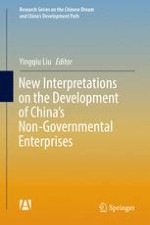2017 | OriginalPaper | Buchkapitel
2. The Post-WTO Era: NGEs’ New Development and the Sustained Rapid Growth of China’s Economy
verfasst von : Xiahui Liu
Erschienen in: New Interpretations on the Development of China’s Non-Governmental Enterprises
Verlag: Springer Singapore
Aktivieren Sie unsere intelligente Suche, um passende Fachinhalte oder Patente zu finden.
Wählen Sie Textabschnitte aus um mit Künstlicher Intelligenz passenden Patente zu finden. powered by
Markieren Sie Textabschnitte, um KI-gestützt weitere passende Inhalte zu finden. powered by
